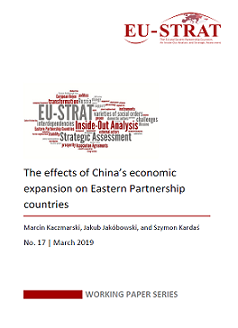Title: The effects of China’s economic expansion on Eastern Partnership countries
Authors: Marcin Kaczmarski, Jakub Jakóbowski, and Szymon Kardaś
Abstract:
This paper aspires to deconstruct China’s policy towards the Eastern Partnership (EaP) countries as well as to measure and assess China’s impact on political regimes in the region. It places Beijing’s actions in the broader context of China’s grand strategy and its policy towards the post-Soviet space and the European Union alike. It focuses on the developments in China’s policy after 2009, i.e. following the start of the EaP. The paper scrutinizes the evolving relevance of the EaP countries for Beijing, deconstructs long-term Chinese goals towards these actors, and identifies key instruments and carriers of foreign policy on the part of Beijing. The study is based on a number of semi-structured interviews with representatives of Chinese academia, think tanks and administration conducted in 2017. In order to measure the impact of China’s policies on local political regimes, the article adopts the theoretical framework of Limited Access Orders (LAOs) and Open Access Orders (OAOs), developed by North, Wallis, and Weingast (2009), and further refined into a typology by Ademmer, Langbein, and Börzel (2018). The empirical analysis leads to the conclusion that due to China’s general foreign policy principles, as well as its recognition of Russia’s alleged interests in the region, Beijing does not aspire to alter local political regimes. However, in the case of Belarus, the Belarusian comprehensive economic and policy cooperation with China within the framework of the Belt and Road Initiative is leading to increased economic openness and the evolution of Belarus’ LAO towards unbalanced closure. The article argues that China’s economic presence in the region brings both challenges and opportunities to the European Union’s policies, which need to be addressed proactively.

